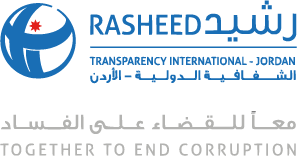Rasheed for Integrity and Transparency and the Institute of Public Administration launch first class of “governance and leadership skills for youth in the public sector” program
The events of the first class of the “governance and leadership skills for youth in the public sector” have been launched on Sunday in cooperation between Rasheed for Integrity and Transparency (Transparency International-Jordan), a non-profit organization and the Institute of Public Administration.
The program is supported by the Rule of Law project and the USAID, and has 50 young participant men and women, comprising employees of ministries, institutes and government departments concerned with finances and investment.
The implementation comes as a response to and manifestation of Royal directives aimed at enabling youth and provide spaces to accomplish achievements and instil the desired change regarding the performance of public sector institutions.
This is in adherence to the contents of the Sixth Discussion Paper, which focuses on achieving governance principles embodies in the rule of law, justice, equality, transparency, equal opportunity, and eradicating favoritism, as the base of the civil state with prudent management.
Moreover, the aim is to enable innovative youth and exert efforts by all state institutions to develop management operations, establishing rule of law and allowing administrative leaders the space to create urgent and necessary change.
Assistant General Director of the Institute of Public Administration, Eng. Fayez Alnahar said that Rasheed for Integrity and Transparency is implementing the project under the supervision of the Government Leadership Center, created in the institute, as part of the cooperation agreement signed between the two parties.
Alnahar said that Rasheed will utilize the expertise of top-notch trainers and specialists in the field, using training methods developed specifically for the purpose, in accordance with a design developed by a technical committee comprising the institute, the Department of Institutional Performance Development and Policies at the Prime Ministry, the Jordan Integrity and Anti-Corruption Commission, the Civil Service Bureau, and Rasheed.
He said that designated a program to the youth segment working in the public sector aims at investing in young energies and encouraging them to form components of change and development in their respective institutions, to be able to influence others, become leaders and carry out development projects, becoming eligible to compete over supervisory and leadership positions in the program.
This is through the knowledge, skills and approaches that the participants will learn and which are at the core of leadership positions, alongside the principles of governance, to be the cornerstone of their performance of their job tasks and a new approach of management in the positions they fill.
Discussing the details of the program, Alnahar said that it targets public sector employees who are not in supervisory or leadership positions and are younger than 30 years of age, with less than 5 years of experience in the sector.
He said that the first class of the program was announced on the official pages of the institute throughout the previous months, whereby applicants wishing to take part filled the participation form and have been picked based on an adopted evaluation method that included various tests and interviews.
Alnahar said that the program will be executed over three stages at a total of 180 training hours, with 6 months designated for each class, each of which includes 50 participants form various government departments, with a total of two classes each year.
The first stage of the program focuses on training regarding leadership skills, the second stage instils nine governance principles and the third includes a graduation program that each participant has to prepare for, emulating the work at their organization and achieving added value regarding institutional performance.
For her part, Executive Director of Rasheed Abeer Mdanat said that this cooperation is part of “Rasheed’s” cooperation with a number of institutions and government departments and out of its goals to boosting the foundations of good governance based on transparency, integrity, accountability, rule of law, and improving the level of integrity and combating corruption.
She said that in the future, this will reflect positively on Jordan’s ranking on the Corruption Perceptions Index, which measures perceptions of specialists on corruption in the public sector, and also enhances awareness of the implications of good governance for the sake of realizing the vision of a “cohesive Jordan with a national integrity system”.




